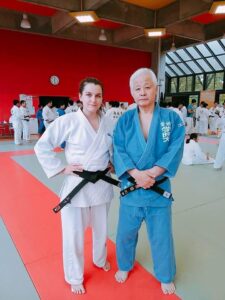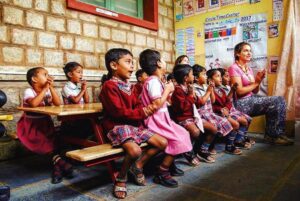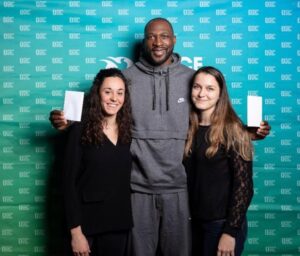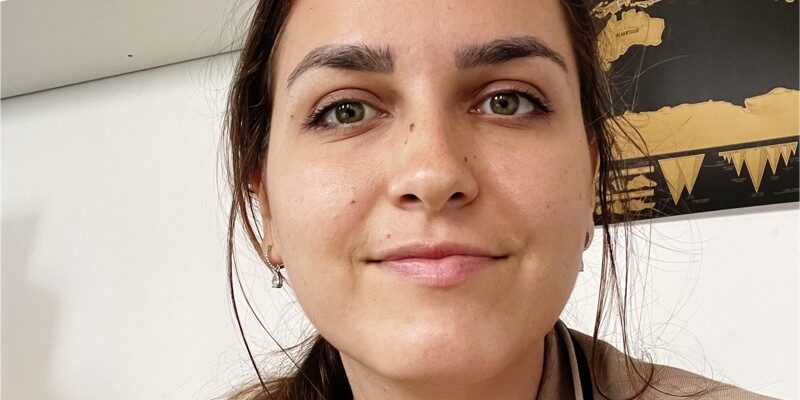- Can you tell us about your journey and what inspired you to pursue social entrepreneurship?
My name is Eve, and I’m from France. I first studied philosophy and project coordination before continuing my studies with a master’s degree in sports management. I first became interested in social entrepreneurship when I went to live in Japan for 1 year. I’d always developed impact projects through sports (particularly judo) or associations, but when I went to Japan, I realized the international scope and the need for projects to be self-financing over the long term.

- What key skills have you gained from your diverse experiences in sports and sustainable development?
The main skill I’ve developed is project coordination: how to create synergies between different stakeholders and duplicate a pilot action to scale up and have a bigger and more interesting impact, taking into account the environment and culture.
- Can you describe a specific project you worked on that made a significant impact on you?
I’m now working on a number of projects. The first that had an impact on me was developing judo for prisoners in Japan. I realized how sport could be used as a vehicle for social change, by giving these people back consideration, an identity and a place in society. Being a prisoner in Japan is very difficult on a social level: you can lose ties with your family and the respect of society. Judo was the gateway to a normal life after that. It was then that I decided to specialize and continue professionalizing in the sports movement.

- What are the biggest challenges you’ve faced in your career, and how did you overcome them?
The most difficult moment of my career was at Covid 19. I had just graduated from my Masters and was ready to start my professional life. The majority of opportunities in the development sports sector were blocked. There were no more competitions or sporting events open to the public. The Tokyo Games were postponed for a year and closed to the public. It was a very special atmosphere. My internship as a marketing assistant and champion for peace at Peace and Sport was cut short because of the pandemic. I decided to move to Switzerland to start my career, working for Décathlon as a sales leader in Lausanne, home of the IOC, to develop my networks and activities around sport for people with disabilities and social inclusion.
- Why is promoting social inclusion and disability in sports important to you?
I think we have everything to gain from inclusion, from new ways of thinking and looking at problems. We all have different abilities and skills. A narrow view of what’s normal and what’s not can trap us all in unfulfilling patterns of thinking.
We can all find ourselves in a situation of disability, for example when we travel and do not speak the language of the country. This is why travel also opened my mind, to see how there are different ways of living and conceiving the world.
- What concrete initiatives have you implemented to promote inclusion for individuals with disabilities in sports?
I worked in sport for inclusion in France and Switzerland, through adapted sports and physical practice but also in inclusion by offering the sports club to welcome people with disabilities. I worked on a platform allowing clubs to form very easily with a guide to be more inclusive and for disabled people to find a sport near them that offers the sport they want. Now I am a program coordinator at Yunus Sports Hub. I coordinate many programs around social entrepreneurship for young people, athletes and organizations. Many social businesses use inclusion and the circular economy to innovate.
- What are the main barriers to social inclusion in sports, and how can we overcome them?
I think the biggest barriers to inclusion through sport are people’s views and lack of training. Because very often, associations think that they do not have the human resources, the time, the money, or the equipment adapted to accommodate people with disabilities. I even saw it with my judo club in Toulouse. One of the judo teachers is also an educator for the disabled and together we were able to develop a partnership with the institute for young blind people to welcome new people to the club. While working at Judo Canada in Montreal, I was able to see the disabled judo team doing the same training as the national judo team. In Canada, they don’t differentiate as much between Olympic and Paralympic sport for training. One of the areas for improvement is education and awareness-raising around the inclusion of disabilities and social minorities.
- How can sports be a powerful tool for sustainable development and peace?
Athletes are role models for society. Their notoriety can be a great advantage for developing all types of projects around social entrepreneurship. There are also great similarities between sporting and entrepreneurial careers. We can find high-level sports skills to manage a social enterprise and carry out projects such as resilience, patience, the ability to set goals and stick to them, surpass oneself, dare to go furthe. The Olympic Games have been a symbol of peace and international cooperation since ancient times. In general, sport can be the gateway to greater action, to create social bonds, break down barriers and be in better health to form a society.
- Can you share concrete examples of projects using sports to create a positive social impact?
With Yunus Sports Hub we are developing numerous projects, around the inclusion of refugees and exiles, training in social entrepreneurship, funds for investment or the development of Social Business. For example,
- Binko is a trash can of the future that automatically sorts wastes when you put it in the
- P2c is a rugby helmet to anticipate player concussions and be able to treat them as best as
- MooveToi offers sports classes as a remedy for the elderly, obese or
- AtmosGear are the roller skates of the future: the first electric roller skates for gentle mobility and no longer using the car for short
- Footeuses + Sports Africa promotes women’s sport in Africa to increase visibility and propel women’s
- Tako is the first ping pong table 100% made in Africa

- What role can international organizations play in promoting sports as a tool for sustainable development?
I encourage international organizations and individuals who work in large groups to develop intrapreneurship. It’s about launching an entrepreneurial project within the company itself. There are lots of different entrepreneur profiles. You don’t have to give up everything to start from scratch to be a good entrepreneur. You can also try to bring your project within an existing organization. This is actually what I started doing with Décathlon. I first wanted to acquire skills in sales, professional positions and financial stability before designing new projects. Décathlon also has its own incubator in France to allow entrepreneurs to test their ideas and get started with initial funding from their own side.
- What advice would you give to young people interested in getting involved in social entrepreneurship?
I encourage young people to start naturally developing project coordination. It can start very simply, by organizing a party, a local sporting event or an artistic and cultural workshop. With event skills, you can start to build partnerships and develop new skills without realizing it. Developing a project, finding innovative ways to finance yourself and seeing it through to the end is the best possible teaching. The ability to adapt and know how to make mistakes is also essential. This is also Professor Yunus’ philosophy: start small but start anyway and do it with joy! Finally, the meaning found in social entrepreneurship goes beyond anything that can be found elsewhere. It is a spark, a flame that burns inside us and that excites us. It’s what makes us alive.
- What are your sources of inspiration for your work?
My main sources of daily motivation are the people I support who are the entrepreneurs of tomorrow. Professor Yunus is also a great source of inspiration for me. Before joining the Yunus Sports Hub and Yunus France, I read the books and works of Professor Yunus. I am very inspired by his philosophy, his way of breaking the codes to develop micro-credit and social entrepreneurship throughout the world. All his speeches invite us to take action and make us feel more capable than ever.
- What do you see as the most promising trends in sports and sustainable development?
There is an increasing ecological awareness, particularly among future generations. We even talk about eco-anxiety. I also recommend the film “Bigger than us” by Flore Vasseur, co-produced by Marion Cotillard, which follows the journey of young social entrepreneurs who act for a better world. With Yunus France, we are developing Yunus Social Business Centers in universities and 3 zeros clubs to give students access to the concept of social businesses to achieve a 3 zeros world:
- Zero poverty
- Zero unemployment
- Zero carbon emissions







